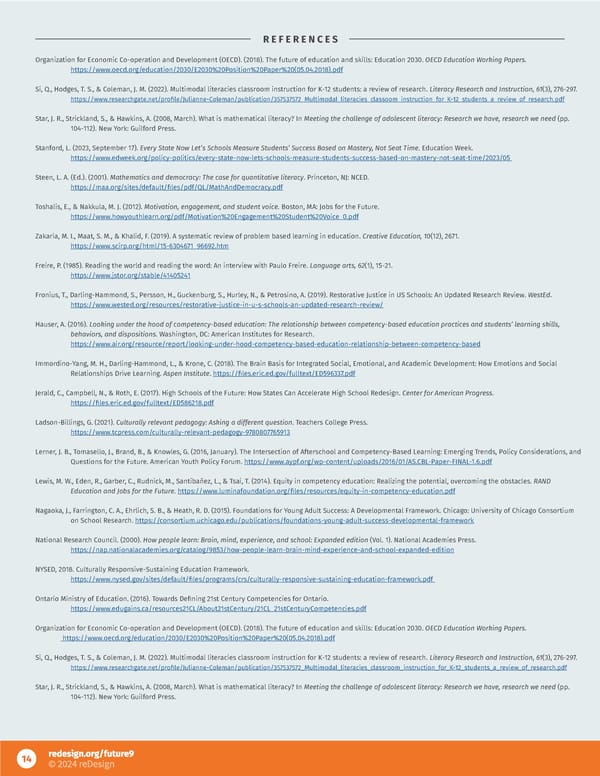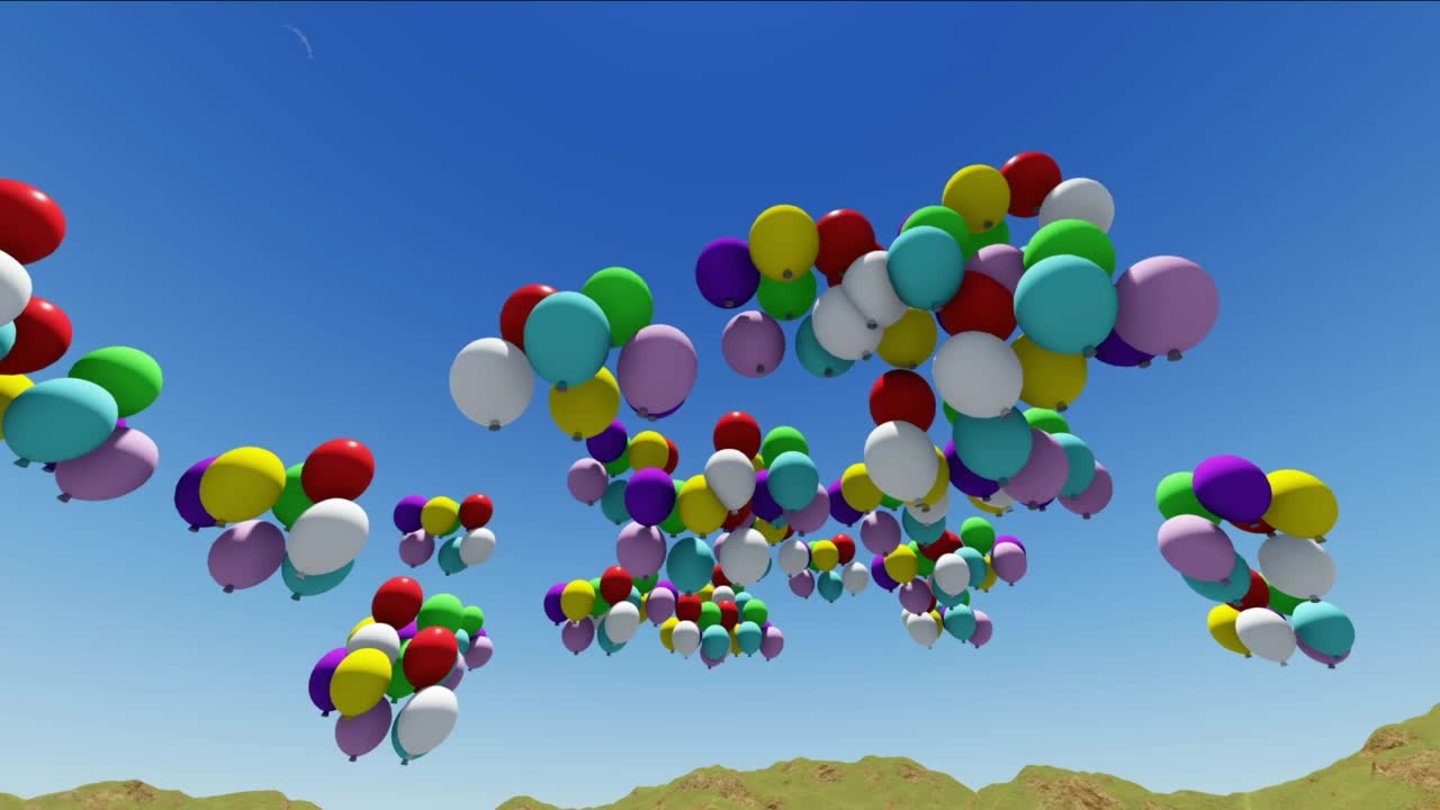REFERENCES Organization for Economic Co-operation and Development (OECD). (2018). The future of education and skills: Education 2030. OECD Education Working Papers. https://www.oecd.org/education/2030/E2030%20Position%20Paper%20(05.04.2018).pdf Si, Q., Hodges, T. S., & Coleman, J. M. (2022). Multimodal literacies classroom instruction for K-12 students: a review of research. Literacy Research and Instruction, 61(3), 276-297. https://www.researchgate.net/pro昀椀le/Julianne-Coleman/publication/357537572_Multimodal_literacies_classoom_instruction_for_K-12_students_a_review_of_research.pdf Star, J. R., Strickland, S., & Hawkins, A. (2008, March). What is mathematical literacy? In Meeting the challenge of adolescent literacy: Research we have, research we need (pp. 104-112). New York: Guilford Press. Stanford, L. (2023, September 17). Every State Now Let’s Schools Measure Students’ Success Based on Mastery, Not Seat Time. Education Week. https://www.edweek.org/policy-politics/every-state-now-lets-schools-measure-students-success-based-on-mastery-not-seat-time/2023/05 Steen, L. A. (Ed.). (2001). Mathematics and democracy: The case for quantitative literacy. Princeton, NJ: NCED. https://maa.org/sites/default/昀椀les/pdf/QL/MathAndDemocracy.pdf Toshalis, E., & Nakkula, M. J. (2012). Motivation, engagement, and student voice. Boston, MA: Jobs for the Future. https://www.howyouthlearn.org/pdf/Motivation%20Engagement%20Student%20Voice_0.pdf Zakaria, M. I., Maat, S. M., & Khalid, F. (2019). A systematic review of problem based learning in education. Creative Education, 10(12), 2671. https://www.scirp.org/html/15-6304671_96692.htm Freire, P. (1985). Reading the world and reading the word: An interview with Paulo Freire. Language arts, 62(1), 15-21. https://www.jstor.org/stable/41405241 Fronius, T., Darling-Hammond, S., Persson, H., Guckenburg, S., Hurley, N., & Petrosino, A. (2019). Restorative Justice in US Schools: An Updated Research Review. WestEd. https://www.wested.org/resources/restorative-justice-in-u-s-schools-an-updated-research-review/ Hauser, A. (2016). Looking under the hood of competency-based education: The relationship between competency-based education practices and students’ learning skills, behaviors, and dispositions. Washington, DC: American Institutes for Research. https://www.air.org/resource/report/looking-under-hood-competency-based-education-relationship-between-competency-based Immordino-Yang, M. H., Darling-Hammond, L., & Krone, C. (2018). The Brain Basis for Integrated Social, Emotional, and Academic Development: How Emotions and Social Relationships Drive Learning. Aspen Institute. https://昀椀les.eric.ed.gov/fulltext/ED596337.pdf Jerald, C., Campbell, N., & Roth, E. (2017). High Schools of the Future: How States Can Accelerate High School Redesign. Center for American Progress. https://昀椀les.eric.ed.gov/fulltext/ED586218.pdf Ladson-Billings, G. (2021). Culturally relevant pedagogy: Asking a different question. Teachers College Press. https://www.tcpress.com/culturally-relevant-pedagogy-9780807765913 Lerner, J. B., Tomasello, J., Brand, B., & Knowles, G. (2016, January). The Intersection of Afterschool and Competency-Based Learning: Emerging Trends, Policy Considerations, and Questions for the Future. American Youth Policy Forum. https://www.aypf.org/wp-content/uploads/2016/01/AS.CBL-Paper-FINAL-1.6.pdf Lewis, M. W., Eden, R., Garber, C., Rudnick, M., Santibañez, L., & Tsai, T. (2014). Equity in competency education: Realizing the potential, overcoming the obstacles. RAND Education and Jobs for the Future. https://www.luminafoundation.org/昀椀les/resources/equity-in-competency-education.pdf Nagaoka, J., Farrington, C. A., Ehrlich, S. B., & Heath, R. D. (2015). Foundations for Young Adult Success: A Developmental Framework. Chicago: University of Chicago Consortium on School Research. https://consortium.uchicago.edu/publications/foundations-young-adult-success-developmental-framework National Research Council. (2000). How people learn: Brain, mind, experience, and school: Expanded edition (Vol. 1). National Academies Press. https://nap.nationalacademies.org/catalog/9853/how-people-learn-brain-mind-experience-and-school-expanded-edition NYSED, 2018. Culturally Responsive-Sustaining Education Framework. https://www.nysed.gov/sites/default/昀椀les/programs/crs/culturally-responsive-sustaining-education-framework.pdf Ontario Ministry of Education. (2016). Towards De昀椀ning 21st Century Competencies for Ontario. https://www.edugains.ca/resources21CL/About21stCentury/21CL_21stCenturyCompetencies.pdf Organization for Economic Co-operation and Development (OECD). (2018). The future of education and skills: Education 2030. OECD Education Working Papers. https://www.oecd.org/education/2030/E2030%20Position%20Paper%20(05.04.2018).pdf Si, Q., Hodges, T. S., & Coleman, J. M. (2022). Multimodal literacies classroom instruction for K-12 students: a review of research. Literacy Research and Instruction, 61(3), 276-297. https://www.researchgate.net/pro昀椀le/Julianne-Coleman/publication/357537572_Multimodal_literacies_classroom_instruction_for_K-12_students_a_review_of_research.pdf Star, J. R., Strickland, S., & Hawkins, A. (2008, March). What is mathematical literacy? In Meeting the challenge of adolescent literacy: Research we have, research we need (pp. 104-112). New York: Guilford Press. 14
 Dig into the Why Page 13 Page 15
Dig into the Why Page 13 Page 15
